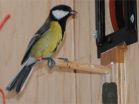Being lower in pecking order improves female tit birds' memory
Rare case in nature in which the female of a species has the better cognitive ability
2014-12-09
(Press-News.org) When it comes to remembering where a tasty titbit was left, female great tit birds are miles ahead of their male counterparts. This ability might have evolved because the females come second when there's food to be shared, argue Anders Brodin and Utku Urhan of Lund University in Sweden. In Springer's journal Behavioral Ecology and Sociobiology, they present one of only a handful of cases in nature in which the female of a bird species has better spatial and learning abilities than the male.
Great tits (Parus major) are highly intelligent and quick learners. These common European songbirds have interesting and ever-changing ways in which they find food, and even use tools such as conifer needles during foraging. Unlike most other members of the tit family, great tits are not food hoarders. Brodin and Urhan have previously demonstrated that they are able to observe where their hoarding relatives have made a stash, only to retrieve it up to 24 hours later.
To test if there are any gender differences in this ability, Brodin and Urhan first allowed caged great tits to observe marsh tits (Poecile palustris) store away food in an indoor aviary. One hour later, great tits of both sexes were released to search for the cached food. The females performed consistently better than males in this memorization task. Male great tits were able to remember where other birds stored food only in 15 percent of the cases. In contrast, the females remembered positions of cached food in 40 percent of the cases. For Brodin and Urhan, this is a remarkable achievement, as the success rate of the females equals the performance of marsh tits and other birds that retrieve their own caches. This suggests that female great tits recover caches they have watched others make as successfully as the hoarders retrieve their own stash.
The researchers argue that female great tits are more skilled cache pilferers because they find themselves in a male-dominated society in which they are often pushed away from available food sources.
"Whereas the males therefore have a more even and reliable food supply, lower-ranking females have to supplement their food by pilfering the stock piles of others," argues Brodin. "Therefore a good memory of where caches are to be found could go a long way to still their hunger."
"Such ability could also be helpful to the female birds in a broader sense," elaborates Urhan. "Females could choose to ignore pieces of food they find when a male is nearby. If she returns later when the male is not close, she decreases the risk of getting the food item stolen by the male."
INFORMATION:
Reference: Brodin, A. & Urhan, A.U. (2014). Sex differences in learning ability in a common songbird, the great tit - females are better observational learners than males. Behavioral Ecology and Sociobiology. DOI 10.1007/s00265-014-1836-2
The full-text article and images are available to journalists on request.
[Attachments] See images for this press release:

ELSE PRESS RELEASES FROM THIS DATE:
2014-12-09
Children of the Information Age are inundated with written words streaming across smartphone, tablet, and laptop screens. A new Tel Aviv University study says that preschoolers should be encouraged to write at a young age -- even before they make their first step into a classroom.
A new study published in the Early Childhood Research Quarterly explains why early writing, preceding any formal education, plays an instrumental role in improving a child's literacy level, vocabulary, and fine motor skills. The research, conducted by Prof. Dorit Aram of TAU's Jaime and Joan ...
2014-12-09
Princeton University researchers have uncovered a previously unknown, and possibly substantial, source of the greenhouse gas methane to the Earth's atmosphere.
After testing a sample of abandoned oil and natural gas wells in northwestern Pennsylvania, the researchers found that many of the old wells leaked substantial quantities of methane. Because there are so many abandoned wells nationwide (a recent study from Stanford University concluded there were roughly 3 million abandoned wells in the United States) the researchers believe the overall contribution of leaking ...
2014-12-09
What drives some subsidiaries to strive for so much autonomy that they are actually harming the parent company? A new study in the Journal of International Marketing shows that these dysfunctional business relationships can be understood and improved using basic psychology.
"A subsidiary's desire for autonomy is psychological in nature. The desire is for more decision making authority in marketing decisions, and the ability to make these decisions without interference from headquarters. Subsidiary employees want to work more independently even if this means risking conflicts ...
2014-12-09
WEST LAFAYETTE, Ind. - A laboratory at Purdue University provided a critical part of the world's first transistor in 1947 - the purified germanium semiconductor - and now researchers here are on the forefront of a new germanium milestone.
The team has created the first modern germanium circuit - a complementary metal-oxide-semiconductor (CMOS) device - using germanium as the semiconductor instead of silicon.
"Bell Labs created the first transistor, but the semiconductor crystal made of purified germanium was provided by Purdue physicists," said Peide "Peter" Ye, a Purdue ...
2014-12-09
Many people have strong habits when it comes to shopping, preferring favorite stores and favorite brands. But a new study in the Journal of Marketing Research suggests that these same shoppers may have hidden habits that are hurting sales.
"Evidence suggests the existence of customer habits, beyond repeat purchases, that have serious implications for profits and firm performance. Whereas repeat purchase habits have been studied and shown to have a positive impact on sales, there are other common habits which have a notably negative effect on a company's bottom line," ...
2014-12-09
Johns Hopkins computers scientists, who have already used Twitter posts to track flu cases, say their techniques also show promise as a tool to gather important information about some common mental illnesses.
By reviewing tweets from users who publicly mentioned their diagnosis and by looking for language cues linked to certain disorders, the researchers say, they've been able to quickly and inexpensively collect new data on post-traumatic stress disorder, depression, bipolar disorder and seasonal affective disorder.
In research presented at three scientific conferences ...
2014-12-09
Take a look in your pantry: the miracle ingredient for fighting obesity may already be there. A simple potato extract may limit weight gain from a diet that is high in fat and refined carbohydrates, according to scientists at McGill University. The results of their recent study were so surprising that the investigators repeated the experiment just to be sure.
Investigators fed mice an obesity-inducing diet for 10 weeks.
The results soon appeared on the scale: mice that started out weighing on average 25 grams put on about 16 grams. But mice that consumed the same diet ...
2014-12-09
This news release is available in French. Montreal, December 9, 2014 -- With the holidays around the corner, we're all a little more likely to indulge, especially when it comes to alcohol. While a few extra drinks might be brushed off as holiday cheer, they can actually signal a problem in young adults.
That's because the bad habits we pick up in our youth may stay with us later in life, according to a new study from Concordia, in collaboration with the Université de Montréal and University of Massachusetts.
Its findings, which were published recently ...
2014-12-09
Smaller recurring donations are generally more beneficial to a non-profit than larger, one-time donations, yet non-profits struggle to convince donors to move beyond one-time contributions. According to a new study in the Journal of Marketing Research, if donors believe that upgrading to a recurring donation will result in a matching donation, many will make the leap.
"Imagine you are given the option to upgrade to a recurring donation. Now imagine that the charity will match all donations made that day, if and only if 75% of donors agree to upgrade to a recurring donation. ...
2014-12-09
Dinosaurs did it. Human beings and monkey do it. And even birds do it. They walk on two legs. And although humans occupy a special position amongst mammals as they have two legs, the upright gait is not reserved only for man. In the course of evolution many animals have developed the bipedal gait - the ability to walk on two legs.
"Birds are moving forward on two legs as well, although they use a completely different technique from us humans," Dr. Emanuel Andrada from the Friedrich Schiller University in Jena (Germany) says. Human beings keep their upper bodies generally ...
LAST 30 PRESS RELEASES:
[Press-News.org] Being lower in pecking order improves female tit birds' memory
Rare case in nature in which the female of a species has the better cognitive ability


